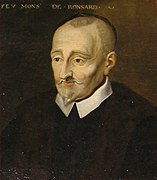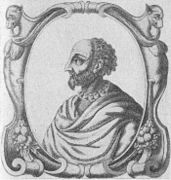La Pléiade
This article needs additional citations for verification. (December 2023) |
La Pléiade (French pronunciation: [la plejad]) was a group of 16th-century French Renaissance poets whose principal members were Pierre de Ronsard, Joachim du Bellay and Jean-Antoine de Baïf. The name was a reference to another literary group, the original Alexandrian Pleiad of seven Alexandrian poets and tragedians (3rd century B.C.), corresponding to the seven stars of the Pleiades star cluster.
Major figures
Notable members of "La Pléiade" consisted of the following people:
The core group of the
To this end du Bellay recommended
The forms that dominate the poetic production of these poets are the Petrarchan
-
Joachim Du Bellay
Minor figures
Minor figures also associated with this term include the following:
- Pontus de Tyard
- Étienne Jodelle
- Rémy Belleau
- Jacques Pelletier du Mans
- Jean de la Péruse
- Guillaume des Autels
Use of the term
The use of the term "Pléiade" to refer to the group the French poets around Ronsard and Du Bellay is much criticised. In his poems, Ronsard frequently made lists of those he considered the best poets of his generation, but these lists changed several times. These lists always included Ronsard, du Bellay, de Baïf,
See also
Notes
- "La Pléiade", or more correctly "La Bibliothèque de la Pléiade", is also the name of a prestigious leather-bound Bible-paper collection of works in French (literature, history, etc.) published by the Éditions Gallimard publishing house.
References
- Simonin, Michel, ed. Dictionnaire des lettres françaises. Le XVIe siècle. Paris: Fayard, 2001. ISBN 2-253-05663-4. (in French)





